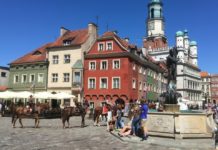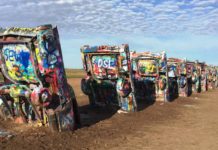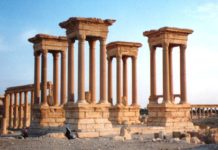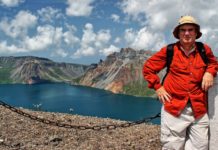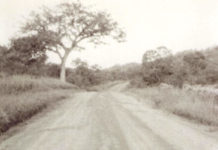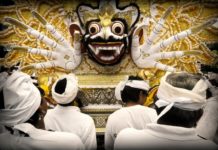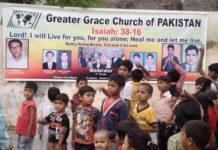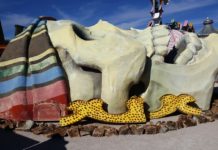CHAPTER 16
War, children, it’s just a shot away. It’s just a shot away. – “Gimme Shelter” by The Rolling Stones (1969)
When we saw La Bubann the next morning, her face was bruised and both of her eyes were red and swollen. Although the police had detained her for only an hour, she had gone to the hospital and didn’t get home until after midnight. Despite being roughed up, she was clearly not the target of the raid. We were the people they were looking for, and she had just gotten in the way.
Over breakfast, I told La Bubann that Ted and I were leaving. She grabbed my hand and began to cry. I knew she was worried about what was going to happen to her and the children. Truthfully, if we stayed, all we would do is bring her more trouble.
Ted and I said goodbye to Bob and Gordon. I was certain that we’d be seeing them again, probably in Nairobi. By noon, we were on a train headed for Kenya. Once we were under way, I noticed many of the passengers looked traumatized. Apparently, they were leaving Uganda under terrible circumstances, and some had visible wounds from beatings.
Out of curiosity, I asked the people around me why they were going to Kenya. As others overheard the conversation, they approached me and wanted to share their stories, too.
An Asian family told me that they were robbed of everything they owned. Others were simply informed that if they didn’t leave, they would be killed. The black Africans said that they were fortunate to be on the train because so many others didn’t have enough money for a ticket. Almost everyone I spoke to was aware of someone who had lost a family member to Amin’s secret police.
When I related what happened to me in Uganda, they stared with wide eyes and palpable fear. It was then that I learned that the compound where we were interrogated was a place they all knew quite well: the infamous Makindye Military Barracks.
An elderly African man told me in a whispered voice that Makindye was a dungeon, a torture chamber, and a facility for mass murder. Truckloads of bodies were removed from the barracks almost daily. I was relieved that I wasn’t aware of that on the morning we were dragged out of La Bubann’s house. I couldn’t get to Kenya soon enough.
“With the camera hanging around my neck, I looked more like a legitimate tourist than a potential spy.”
The last stop on the train was a small village called Tororo. The beleaguered passengers informed us that we were still ten kilometers from the Kenyan border. Ted and I hitchhiked along the desolate road and hoped that we wouldn’t get offered any rides from military vehicles. If one had stopped for us, I seriously doubted if we’d have gotten into it.
A mile south of the train station, something on the ground caught my eye. I picked it up and saw that it was a Pentax camera with a 100-millimeter lens and no case. It was sitting as if it had been gently placed there just moments ago. I looked around in all directions, but no one was in sight. Maybe I would run into the person who lost it by the time we got to Kenya.
With the camera hanging around my neck, I looked more like a legitimate tourist than a potential spy. A car with a nicely dressed African man and woman stopped for us. Luckily, they were going all the way to the border, and they didn’t appear threatening. As we drove along, there was almost no conversation.

When we reached the immigration station, huge crowds of people were trying to cross into Kenya. Many looked distressed like those we had seen on the train. The chaotic scene resembled our arrival in Juba. Without any difficulty, we passed through immigration.
Once officially in Kenya, I breathed an enormous sigh of relief.
Ted announced, “Let’s get a drink.”
We saw a restaurant across the street and headed straight for it.
Right away, I could see that Kenya was different than Uganda. The stress level was greatly reduced, and everyone we met was friendlier and more relaxed. They actually seemed happy to see us.
At the restaurant, we had a huge lunch of roasted chicken, vegetables, salad, bread, and so much beer that we were drunk by the time we walked out. We asked our waiter if anyone had reported losing a camera but nobody had.
“Nairobi reminded me of a European capital with its wide boulevards and modern architecture.”
The landscape was quite different in Kenya, and the terrain had turned from lush green jungles to a flat, arid desert region. On the horizon were some impressive mountains. After studying the map, I calculated that Nairobi was about 250 miles to the southeast. The trip would take us through the Great Rift Valley and over the mountains.
We got rides easily, first from a commercial truck driver, then one from a park ranger in a new government-issued Land Rover. He took us to the foot of the mountains where we decided to camp for the night. As we settled in, it was a comforting feeling to no longer be worried about the secret police.
The highway that took us over the mountains was extremely steep and twisting, but fortunately it was in good condition, and the scenery was magnificent. Sheer volcanic cliffs dropped off hundreds of feet, and waterfalls spilled into deep valleys.
After descending from the mountains, I saw cattle grazing in spacious open areas with groups of men attending to them. From a distance, the tall, reed-thin men appeared to be totally naked, but as we got closer, it turned out that they were covered in skimpy loin cloths. A number were dressed in bright red material that was loosely wrapped around them. It was my first glimpse of the Maasai people, the famous Kenyan tribesmen who were known as herders.
Nairobi was the most modern city I’d seen in Africa. It reminded me of a European capital with its wide boulevards and modern architecture. Dominating the skyline was a unique, cylindrical shaped building approximately twenty stories high.
Ted and I decided to splurge on a decent hotel for one night. Both of us craved a hot bath or shower, something we had not enjoyed for weeks. Once we made our way to the main business section of the city, we discovered that the cylindrical building was the fancy new Nairobi Hilton. Without a doubt, that was where we’d spend the night.
When we entered the sparkling lobby, everyone stopped what they were doing and stared at us. Covered with dirt and hauling our backpacks, we were obviously not the typical clientele. Most tourists were here to spend a lot of money on safari or trips to the game reserve.
Nevertheless, when Ted and I stepped up to the main desk, we were treated respectfully, especially when they saw our American passports and American Express traveler’s checks. Our large room on the fifteenth floor had a spectacular view of the city. We each took decadently long hot baths, and we ordered steaks and whiskey sours from room service for dinner. We kept the drinks coming until well past midnight when we both passed out.
The following day, instead of spending more money at the Hilton, we decided to look for a cheaper place to stay. When we checked out of the hotel, our total bill came to only one hundred American dollars. Talk about money well spent! In a grimier part of town, we found a disgustingly dirty, run down youth hostel.
“Being six days away from breaking the law and becoming a criminal hit me hard. I was about to be a wanted man.”
Since I was unwilling to spring for the cost of a trip to the game reserves, there wasn’t much reason to stay in Nairobi. It was an expensive city, and I was starting to feel pressure to count every remaining dollar. I also wanted to buy a new tent and portable stove for the next leg of our journey.
I had practically no idea what was going on in the world, so I picked up a newspaper and a couple of magazines. I read big headlines about a political scandal called Watergate, and that the war in Vietnam continued to rage on.
When I went to American Express to collect my mail, I had three letters from my parents and a nice big white envelope from the Selective Service System.
“Fuck, not again!” I thought as a wave of depression washed over me.
As always, I opened it last.
My parents wrote that they continued to be very worried about my draft situation. They wanted to know if I’d given any thought as to how I planned to resolve it or if I’d considered filling out the conscientious objector application. Because communication from this part of the word took such a long time, they were unware that I had already filled it out and mailed it from Uganda.
The letter from the Selective Service System contained more bad news. Again, they gave me one of three military locations, San Francisco, Guam, or Germany to report to by August 12, 1972.
Unfortunately, I was reading the letter on August 6th. The odds of them reading my letter from Kampala before the deadline were slim. Being six days away from breaking the law and becoming a criminal hit me hard. I was about to be a wanted man. Presumably, I’d hear from them when I reached my next mailing address: Dar es Salaam, Tanzania.
Ted and I hitchhiked out of Nairobi and headed for Mombasa, the second largest city in Kenya. From there, we planned to head south along the coast of the Indian Ocean all the way down to Dar es Salaam. The roads were bad, but we managed to get rides in a variety of vehicles, including a giant lumber truck. We rode in the back of it for two hundred miles.
The scenery changed from desert to lush jungle, then to rocky cliffs and low mountains. During one of our rides, we rode through vast stretches of plains and pastures where cattle, goats, and sheep grazed. Dotting the savannah were the iconic Baobab trees with their telltale vast trunks. We passed through quaint, but rundown villages populated by a variety of people: poor villagers, veiled Muslim women, old Arab men shuffling along dusty streets, and the cattle-herding Maasai warriors off in the distance.
On my twentieth birthday, I was surprised with a wonderful gift. As we came over a hill and rounded a curve, we were greeted with a breathtaking view of a snowcapped Mt. Kilimanjaro. Ted, the driver, and I sat on the side of the road and enjoyed a leisurely lunch. I believed it was a good omen.
Mombasa was an old seaport on the coast of the Indian Ocean with the trappings of modern tourism creeping in around the edges. Kenya’s huge port city had miles and miles of perfect white sandy beaches. Ted and I discovered a cheap, yet well equipped, camping area for tourists close to the beach. Eagerly, we broke out our new tent and gas stove. In addition to the beach, the nicest feature of the campsite was the shower with hot water.
Gentle ocean breezes blew through the palm trees, and a tropical feeling filled the air. Since it was fifteen minutes by public bus, Ted and I often ventured into the city and always managed to find a good bar.
It had rained on and off since we arrived, but before long it became a non-stop torrential downpour. Our new tent seemed to be waterproof and held up well, but we soon learned that Kenya’s monsoon season had just begun. Traveling under such conditions simply wasn’t possible. We had no choice but to wait it out for the next three weeks.
“She got on top of me, started to undress me, and soon we were both panting like two dogs in heat.”
What helped us survive the sheer boredom was our chessboard. Ted and I played all day and took a break only for meals or a short nap. Although we were both decent at the game, I had a slight edge. After a while, I started to dominate Ted, and I think that it was getting on his nerves. Being cooped up in the tent for days made us both a little testy.
Finally, one morning the weather broke, and the incessant rain gave way to some sunshine. We opened up our tent to air it out and sat on the beach. As the sun got higher in the sky, we went for a swim in the warm Indian Ocean. Unlike the Pacific, it was possible to wade out several hundred feet from the shore and still be in chest-deep water.
Later that afternoon, while Ted and I were sitting on the beach playing chess, an older woman approached us and looked interested in what we were doing. She introduced herself and told us that she was staying at a resort up the beach. Then she proudly declared, “I’m a former United States women’s chess champion.”
“Oh, you should play Gregg,” Ted said. “He’s been kicking my butt for days.”
Minutes later, she and I were engaged in an intense game. While sitting there locked in combat, two girls who were walking on the beach came up to us and were curious to see what was going on. They watched closely as the champion wasted no time checkmating me. After she left, the girls stayed around and talked to us.
Emily and Veronica were both from Boston, and they seemed thrilled to meet two swashbuckling American guys. They were staying with their parents at a nearby tourist lodge. The girls were about our age, but neither was especially attractive. As the four of us talked, it became clear to me that they had nothing intelligent to say. Ted got up and said that he was going back to the tent to take a nap. A few minutes later, Emily left too.
Veronica and I found ourselves alone on the beach with not much to talk about. I was reluctant to tell her too many personal details, so I bullshitted about being an adventurer who was off to see the world. As we sat in the sand, Veronica began rubbing her foot up against mine. Since we didn’t have anything to say to one another, I suggested that we go for a walk on the beach.
We strayed a good distance from the campsite and her tourist lodge, and it was beginning to get dark. The coastline was completely deserted, and there were no houses or people in sight. It wasn’t long before we were rolling around in the sand and making out. Veronica got on top of me, started to undress me, and soon we were both panting like two dogs in heat.
Under the moonlight shining over the Indian Ocean, I took off her clothes, and we had sex on the beach. What should have been an incredibly romantic moment in one of the most exotic locations in the world was nothing more than a lusty, down-and-dirty experience. Both of us were covered with sand after just a few sweaty minutes of unbridled passion.
Afterwards, we rinsed ourselves off in the ocean, got dressed, and slowly walked back up the beach. We held hands but didn’t exchange many words. Veronica announced that she loved me and that I was the best thing that had ever happened to her.
“Even if we never see each other again,” she gushed, “I will never forget this evening as long as I live.”
I was relieved that she was aware that there was a good possibility that we would not cross paths again. Although I was uncomfortable and wanted to get away from her as fast as I could, I tried to act decently and be a gentleman. Already, I regretted what we had done.
When I returned to the tent, Ted gave me a good ribbing for having seduced her. He laughed at what a dog I was, but I tried not to let him get to me. Hell, I hadn’t been with a woman in a while, and I felt pretty good. I saw it for exactly what it was: a chance to get laid.
“Through a network of teachers and other professionals, they kept up on the local news and politics of the region.”
After many rain-soaked days, we packed up our things and pulled out of Mombasa. The monsoon hadn’t completely stopped, but we were anxious to get on the road to Tanzania. The trip from Mombasa to Dar es Salaam was a fascinating 600-mile drive down the east coast of Africa. Along the way, we passed dozens of small, primitive villages that seemed to survive on fishing and rudimentary farming.
The roads were muddy and even washed out in several places, and we caught rides in vehicles that were made to travel on that type of terrain. After two days of bouncing around in the back of Land Rovers and similar instruments of discomfort, our aching bodies were covered in bruises.
The final ride into Dar es Salaam was from a cool, young white South African couple named Rolf and Marta. They were both teachers at a university in Tanzania’s capital. Thankfully, they were driving a very comfortable Volvo.
Rolf and Marta had been on vacation and were returning to their home in Dar es Salaam. They invited us to stay with them, and after stopping to buy some local produce, we arrived at their house where they cooked a delicious meal. To be in the company of people with whom we could be totally at ease was a relief. Rolf and Marta spoke perfect English and provided hours of stimulating conversation.
Ted and I excitedly told them about our plan to live and work in South Africa, but they dashed our hopes when they explained that it wasn’t easy to enter South Africa. The government was wise to Americans, Australians, British, and Canadians who wanted to spend time in the country in order to make money.
Rolf informed us about South Africa’s stiff requirements to enter. A person needed a minimum amount of cash, plane tickets home, and proof that one didn’t plan to live off their economy or take a job from one of their citizens.
They also talked about Ian Smith, the ruler of Rhodesia. He ran an outlaw government which had broken away from Britain following the end of colonial rule and sounded every bit as nuts as Idi Amin. Hearing this wasn’t good news because Ted and I had to travel through the country to get to South Africa.
Rolf and Marta weren’t typical white South Africans and bitterly railed against the abusive apartheid government. They also told us some ghastly tales about Uganda and Idi Amin. Tanzania, they explained, was extremely concerned about Amin. The military even had occasional skirmishes with his forces along their small shared frontier.
When we told them how we were terrorized by the secret police in Kampala, and hustled off to a place called Makindye, they looked at us in utter disbelief. Rolf and Marta were aware of what was happening in East Africa. Through a network of teachers and other professionals, they kept up on the local news and politics of the region.
Marta had heard a lot about Makindye. She explained that the police who took us there were undoubtedly from Amin’s infamous Public Safety Unit, which was nothing more than a classy name for his personal group of thugs. She’d also heard reports of Westerners being harassed and detained in Uganda.
Ted and I talked about our buddies, Bob and Gordon, and recounted how Gordon had been pistol whipped for complaining when a soldier knocked over his guitar. Rolf and Marta abruptly fell silent. Then they started asking questions about them. They mainly wanted to know why they were no longer traveling with us.
When we explained that we’d left them behind in Kampala, they became visibly shaken. At first, I wasn’t sure why they were so upset, but then it became clear. A week earlier they had heard a report about two young Western tourists who had been killed in Uganda. Supposedly, they’d run afoul of Amin’s Public Safety Unit. But the specific detail that stood out in their recollection was that one of the guys had a guitar.
Ted and I looked at each other in shock and disbelief. We knew it must have been our friends, Bob and Gordon.


